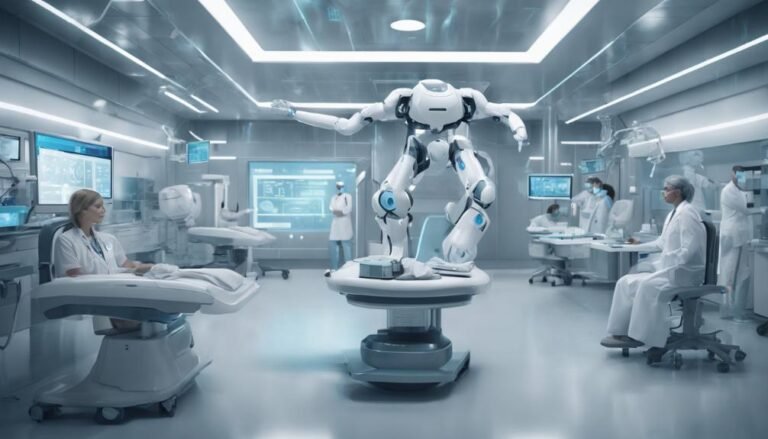AI in Continuing Medical Education
In the domain of Continuing Medical Education, AI integration is reshaping the landscape of professional growth and knowledge enhancement for healthcare practitioners. Imagine a world where learning is tailored to your needs, skills are honed through personalized guidance, and progress is meticulously tracked to guarantee competence. The impact of AI in this field goes beyond mere convenience; it opens doors to a realm of possibilities that could redefine the future of medical education and practice.
Key Takeaways
- AI enhances personalized learning paths in CME.
- Adaptive tools provide real-time tracking and tailored experiences.
- Real-time feedback improves engagement and performance monitoring.
- Virtual simulation training offers realistic scenarios for critical thinking.
- Intelligent content recommendations optimize education efficiency and adaptability.
Personalized Learning Paths
Healthcare professionals can benefit from personalized learning paths in Continuing Medical Education, tailored to their specific knowledge gaps and learning preferences. Personalized study plans offer a targeted approach to addressing individual needs, ensuring that healthcare providers receive the most relevant and impactful education.
Interactive learning modules play a vital role in engaging learners and promoting active participation in the learning process. These modules enable healthcare professionals to interact with the content, reinforcing their understanding and retention of key concepts.
Moreover, tailored educational resources provide healthcare professionals with access to materials that are specifically curated to meet their unique learning requirements. By offering customized skill-building opportunities, Continuing Medical Education programs can enhance the practical competencies of healthcare providers, ultimately improving patient outcomes.
Through the implementation of personalized learning paths, healthcare professionals can maximize the effectiveness of their educational experiences and optimize their professional development.
Adaptive Assessment Tools
You can enhance your medical education with Adaptive Assessment Tools that offer personalized learning experiences tailored to your specific knowledge gaps.
These tools provide real-time performance tracking, allowing you to monitor your progress and identify areas that need improvement.
Personalized Learning Experiences
Utilizing adaptive evaluation tools within continuing medical education programs offers learners personalized learning experiences tailored to their individual knowledge gaps and learning styles. Personalized evaluation tools, such as interactive case studies, provide a dynamic approach to evaluating and addressing the specific needs of medical professionals undergoing training. These tools employ adaptive learning modules that adjust content delivery based on the learner's responses, ensuring that educational material is relevant and engaging.
Interactive case studies, a common feature of personalized evaluation tools, allow learners to apply theoretical knowledge to practical scenarios, fostering critical thinking and problem-solving skills. Additionally, adaptive learning modules analyze learner performance in real-time, identifying areas of weakness and offering tailored feedback strategies to enhance understanding and retention.
Real-Time Performance Tracking
Interactive case studies and adaptive evaluation tools not only enhance personalized learning experiences in continuing medical education but also enable real-time performance tracking through dynamic assessment methods. Through the utilization of performance analytics and predictive modeling, these tools offer insights into learners' progress and proficiency levels instantly.
Real-time performance tracking allows for the identification of strengths and areas needing improvement promptly. By monitoring performance metrics continuously, educators can tailor interventions to address specific learning needs effectively. Additionally, the data generated from real-time tracking can inform behavior modification strategies to optimize learning outcomes.
Personalized interventions based on real-time performance data enable learners to receive targeted support and resources that align with their individual learning pace and preferences. This adaptive approach to assessment and feedback fosters a more efficient and tailored learning experience in continuing medical education, ultimately enhancing knowledge retention and application in clinical practice.
Targeted Knowledge Reinforcement
Targeted knowledge reinforcement in continuing medical education is facilitated through the utilization of adaptive assessment tools designed to personalize learning experiences and enhance knowledge retention. These tools adjust the difficulty of questions based on individual performance, making sure that learners are consistently challenged at an appropriate level.
By adapting to the learner's responses, cognitive load is optimized, allowing for efficient information processing and retention.
Adaptive assessment tools play a vital role in targeting areas where learners may be struggling, offering additional support and resources to reinforce understanding. This personalized approach not only improves learning outcomes but also enhances engagement and motivation.
By focusing on individual needs, these tools help minimize cognitive overload, enabling learners to absorb and recall information more effectively.
Moreover, the adaptive nature of these assessment tools ensures that learners receive targeted reinforcement in areas that require attention, leading to improved learning retention.
Real-time Feedback Mechanisms
Implementing real-time feedback mechanisms in AI-driven continuing medical education programs enhances learning outcomes by providing immediate insights and corrective actions to learners during their training sessions.
Instant feedback plays a vital role in improving the training effectiveness by offering learners timely guidance on their performance, enabling them to rectify errors promptly. Through AI monitoring, real-time feedback mechanisms can analyze learner engagement levels, identifying areas where participants may be struggling or losing focus. This allows for personalized interventions to re-engage learners effectively.
Furthermore, real-time feedback mechanisms enhance the overall learning experience by creating a dynamic educational environment where learners receive continuous updates on their progress.
Virtual Simulation Training
You'll explore the effectiveness of Virtual Simulation Training in continuing medical education.
Realistic virtual patient scenarios provide a platform for healthcare professionals to engage in hands-on practice in a controlled environment.
These adaptive learning experiences offer personalized training that can enhance clinical decision-making skills and improve patient outcomes.
Realistic Virtual Patient Scenarios
Integrating realistic virtual patient scenarios into continuing medical education through virtual simulation training enhances the experiential learning process for healthcare professionals. These scenarios provide a dynamic platform for practitioners to engage in patient diagnosis, treatment planning, disease management, and clinical decision-making in a controlled, risk-free environment. By immersing themselves in these virtual scenarios, healthcare professionals can apply theoretical knowledge to practical situations, honing their diagnostic skills and treatment strategies.
Virtual patient scenarios offer a safe space for healthcare professionals to make mistakes, learn from them, and refine their decision-making processes. Through interactive simulations, practitioners can navigate complex medical cases, receive immediate feedback, and track their progress over time. This hands-on approach to learning fosters critical thinking, enhances problem-solving abilities, and ultimately improves patient outcomes in real-world clinical settings.
Adaptive Learning Experiences
Enhancing continuing medical education through adaptive learning experiences in virtual simulation training provides healthcare professionals with personalized and dynamic educational opportunities. By integrating gamified learning experiences, these adaptive platforms offer a tailored approach to learning, catering to individual needs and preferences.
Through adaptive learning experiences, healthcare professionals can engage in realistic scenarios that mimic patient interactions, enabling them to apply theoretical knowledge in practical situations. These platforms utilize advanced algorithms to analyze user interactions and performance, adjusting the learning content to suit the individual's proficiency level and learning pace.
Moreover, adaptive learning experiences in virtual simulation training foster peer collaboration opportunities, allowing healthcare professionals to engage in discussions, share insights, and learn from each other's experiences. This collaborative environment enhances critical thinking skills, promotes knowledge sharing, and fosters a sense of community among learners.
Data-driven Curriculum Design
Utilizing data analytics in the design of medical education curricula allows for evidence-based decision-making and optimization of learning outcomes. Data analysis plays an essential role in identifying patterns, trends, and gaps in educational content.
By analyzing learner performance data, educators can tailor curricula to meet the specific needs of individual students or cohorts. This data-driven approach enables the identification of areas where learners may be struggling, allowing for targeted interventions to improve comprehension and retention.
Moreover, curriculum optimization through data analysis involves continuous monitoring and adjustment of educational content based on real-time feedback. By collecting data on learner interactions, assessments, and outcomes, educators can refine and improve the curriculum to enhance overall learning effectiveness.
This iterative process ensures that the curriculum remains relevant, engaging, and aligned with the latest advancements in medical knowledge.
Intelligent Content Recommendations
You can enhance the efficiency of medical education through Intelligent Content Recommendations, which offer Personalized Learning Paths tailored to individual learners.
Real-Time Topic Suggestions provided by AI algorithms can keep you up-to-date with the latest medical advancements and knowledge areas, ensuring a dynamic learning experience.
Moreover, Adaptive Content Delivery adapts to your learning pace, optimizing retention and understanding of complex medical concepts.
Personalized Learning Paths
Individualized learning paths based on intelligent content recommendations are revolutionizing the way continuing medical education is delivered. Through sophisticated algorithms, learners now have access to personalized educational journeys that cater to their individualized progress and educational needs. These tailored curriculums are designed to optimize learning outcomes by presenting content that aligns with the learner's knowledge level, learning style, and professional goals.
By leveraging artificial intelligence, personalized learning paths offer a more efficient and effective way for medical professionals to acquire new knowledge and skills. The system analyzes past performance, areas of interest, and competency gaps to suggest relevant educational materials, courses, and assessments. This adaptive approach not only saves time but also guarantees that learners receive targeted content that enhances their understanding and retention of medical concepts.
In essence, personalized learning paths empower individuals to take control of their continuing medical education journey, enabling them to focus on areas that require improvement while bypassing redundant or already mastered topics. This tailored approach enhances engagement, motivation, and ultimately, the quality of medical education.
Real-Time Topic Suggestions
Real-Time Topic Suggestions powered by artificial intelligence provide medical professionals with dynamic and tailored content recommendations to enhance their continuing medical education experience. This innovative approach leverages AI algorithms to analyze user behavior, preferences, and learning patterns in real-time, offering personalized suggestions for educational materials, courses, and resources. By harnessing the power of AI, medical professionals can access relevant and up-to-date content that aligns with their individual learning needs and goals.
Ethical considerations play an important role in the implementation of Real-Time Topic Suggestions in continuing medical education. It's vital to guarantee transparency in how AI algorithms make content recommendations and to address any potential biases that may arise from the data used. Safeguarding patient privacy and maintaining the integrity of medical information are paramount in this regard.
Implementation challenges faced with Real-Time Topic Suggestions include the need for robust data security measures, effective algorithm training to improve recommendation accuracy, and continuous monitoring to evaluate the system's performance and user satisfaction.
Overcoming these challenges requires collaboration between AI developers, medical educators, and regulatory bodies to establish best practices and standards for the ethical and effective implementation of AI-driven content recommendations in continuing medical education.
Adaptive Content Delivery
The implementation of adaptive content delivery in continuing medical education involves leveraging artificial intelligence to provide tailored and dynamic recommendations for educational materials and resources. Through AI-driven customization, interactive engagement is enhanced by offering learners content that aligns with their specific learning needs and preferences. This personalized approach guarantees that learners receive relevant information, leading to improved knowledge retention and application in clinical practice.
Furthermore, adaptive content delivery fosters learner engagement by offering personalized feedback based on individual progress and performance. By analyzing learner interactions with the educational material, AI algorithms can provide timely and targeted feedback, guiding learners towards areas that require further focus and reinforcement.
This real-time feedback loop not only enhances the learning experience but also promotes self-directed learning and mastery of medical concepts.
Enhanced Accessibility Features
Implementation of enhanced accessibility features in AI-driven continuing medical education platforms has greatly improved user experience for learners with diverse needs. By incorporating enhanced collaboration tools and interactive case studies, these platforms facilitate engagement and knowledge retention among users.
Accessible multimedia resources, such as videos with closed captions and audio descriptions, guarantee that learners with visual or hearing impairments can fully participate in the educational content. Additionally, interactive quizzes with customizable settings allow individuals with cognitive disabilities to adjust the difficulty level based on their learning pace.
These accessibility features not only cater to the needs of learners with disabilities but also benefit all users by providing a more inclusive and user-friendly learning environment. The interactive nature of the content enhances overall engagement and promotes active learning, making the educational experience more dynamic and effective.
As AI continues to advance in the field of medical education, the integration of enhanced accessibility features will play an essential role in ensuring equitable access to knowledge for all learners.
Automated Progress Tracking
Automated progress tracking in AI-driven continuing medical education platforms enhances learner performance evaluation and feedback efficiency. By incorporating features such as engagement monitoring and progress analysis, these systems provide valuable insights into individual learning journeys.
Engagement monitoring allows educators to gauge the level of interaction and participation of each learner with the educational material, identifying areas that may require additional attention. Progress analysis, on the other hand, enables the tracking of learning milestones and the identification of potential bottlenecks in knowledge acquisition.
The data collected through automated progress tracking feeds into performance evaluation mechanisms, allowing for a more objective assessment of each learner's strengths and weaknesses. This information can then be utilized to tailor learning experiences, optimizing the educational process for better outcomes.
AI-Powered Mentorship Programs
Enhancing learner engagement and performance evaluation, AI-powered mentorship programs in continuing medical education leverage advanced algorithms to provide personalized guidance and support to individuals on their educational journey. These programs utilize sophisticated AI algorithms to analyze learners' progress, identify areas for improvement, and tailor mentorship interactions to meet individual learning needs effectively.
When implementing AI-powered mentorship programs, it's crucial to consider ethical considerations related to the use of AI algorithms. Ensuring transparency in how AI algorithms make decisions and safeguarding patient data privacy are paramount.
Additionally, regulatory compliance with AI applications in medical education must be upheld to guarantee the legality and ethicality of these mentorship programs. Adhering to established guidelines and standards helps maintain the integrity and trustworthiness of AI-driven mentorship initiatives in continuing medical education.
Future Trends and Challenges
Considering the rapid advancements in artificial intelligence technology, the future of AI in continuing medical education presents promising trends and formidable challenges. Technological advancements are expected to revolutionize the delivery of medical education, offering personalized learning experiences tailored to individual needs. AI algorithms can analyze vast amounts of data to identify knowledge gaps and recommend specific educational content, enhancing the efficiency and effectiveness of learning.
Additionally, virtual reality and simulation technologies powered by AI can provide immersive training experiences, allowing healthcare professionals to practice complex procedures in a safe environment.
However, along with these advancements come ethical considerations that need to be addressed. The use of AI in medical education raises concerns regarding data privacy, algorithm bias, and the potential dehumanization of the learning process. Safeguarding patient information and ensuring fairness and transparency in algorithmic decision-making will be critical in maintaining trust and ethical standards in AI-driven education.
As AI continues to evolve in the field of medical education, balancing technological innovation with ethical principles will be a key challenge moving forward.
Conclusion
To sum up, AI in continuing medical education acts as a guiding compass in the vast sea of knowledge, steering healthcare professionals towards mastery and excellence.
Like a skilled navigator, AI charts personalized learning paths, adjusts course with adaptive tools, and provides real-time feedback to guarantee success.
Embracing this transformative technology is akin to discovering the secrets of the universe, paving the way for a brighter future in healthcare education.







